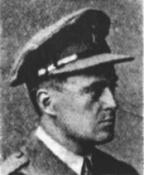
War Memorial
| Captain William Gerald MARTIN | |
|
B Company, 12th (Service) Battalion King’s Royal Rifle Corps Date of birth: 2nd February 1889 Date of death: 14th January 1917 Killed in action aged 27 Buried at Combles Communal Cemetery Extension Plot VII Row H Grave 40 |

|
| William Gerald Martin was born at 4 Queen’s Gardens, Hyde Park London on the 2nd of February 1889 the younger son of Edward Martin JP, a barrister-at-law, and Alice Maud (nee Cammell) Martin later of “Woodcote”, Forest Row in Sussex. He was christened at Christ Church, Lancaster Gate on the 9th of March 1889. He was educated at Hazelwood School until July 1902 where he was a member of the Choir. On leaving the school the magazine wrote of him: - "....goes to Eton. He is an excellent choir leader, a good actor, and should make a golf player of the highest order." He went on to Eton College where he was in Mr. Macnaughton’s house. On leaving school in 1906 he studied with a number of land agents and by the outbreak of war he was an Assistant Land Agent at Ockham Park, Surrey. He attended the Royal Military Academy, Woolwich as a Sandhurst Cadet from September 1908 to March 1909 but did not graduate. He was a well known golfer in Sussex and Surrey being a member of the Royal Ashdown Forest , where he was regarded as one of the club's top players, and was a founder member of St George’s Hill Golf Club. He won many prizes at open and club meetings. In 1911 he won the Gold Medal at the Royal Ashdown Forest Autumn Meeting with the best aggregate score of 162 over two days and won it again in 1912. In 1921 his family and friends presented the Gerald Martin Trophy to the St George's Hill Club which is still contested annually. Following the outbreak of war he applied for a commission in the King's Royal Rifle Corps on the 4th of November 1914 and was commissioned as a 2nd Lieutenant in the regiment on the 28th of November 1914, He embarked for France with his battalion on the 23rd of July 1915 and disembarked at Boulogne the following day. He was promoted to Lieutenant on the 1st of December 1915 and to Captain on the 7th of December 1916. His father received the following telegram dated the 24th of July 1916: - "Beg to inform you Lt W.G. Martin Kings Royal Rifles admitted No. 30 General Hospital Calais July 21st with influenza slight." He embarked for England from Calais on board the SS "Brighton" on the 30th of July 1916 and landed at Dover later the same day. A Medical Board was convened at the Royal Herbert Hospital, Woolwich on the 5th of August 1916 to report on his condition: - "He had tonsillitis about six weeks ago - after this was troubled with headaches and then influenza attack began July 20th. Since then he has had severe neuralgia in his head - he is improving." He was considered to be fit for light duty on the 4th of September 1916 and was posted to the 18th Training Reserve Battalion at South Camp, Seaford. A further Medical Board, which sat at the Surrey Home, Seaford on the 21st of September 1916, reported that he had recovered and that he was fit for general service. On the afternoon of the 12th of January 1917 the 12th Battalion King's Royal Rifle Corps entered support trenches in the area of Bolueax Wood. The following day they moved into the front line trenches at Sailly-Saillisel where they relieved the 11th Battalion of their regiment. B Company, under the command of William Martin, was on the left of the battalion's line. On the night of the 14th of January William Martin went out to check on the condition of the wire in front of his Company's positions. He was hit by a rifle bullet and killed. His father received the following telegram dated the 18th of January 1917: - "Deeply regret to inform you Lieut. W.G. Martin Kings Royal Rifles was killed in action January fourteenth. The Army Council express their sympathy." He was buried in a cemetery at Leuze Wood but his body was later moved to its present location. His commanding officer wrote: - “His death is a great loss to us all, both as a friend and an officer. I know that all of us, both officers and men, had a great regard for him and will miss him exceedingly. He was always willing and did his work well and was always cheerful even in trying circumstances and I could not have wished for a better or braver officer.” He is commemorated on the war memorial at Forest Row. |
|
| Went on to Eton College |
Back